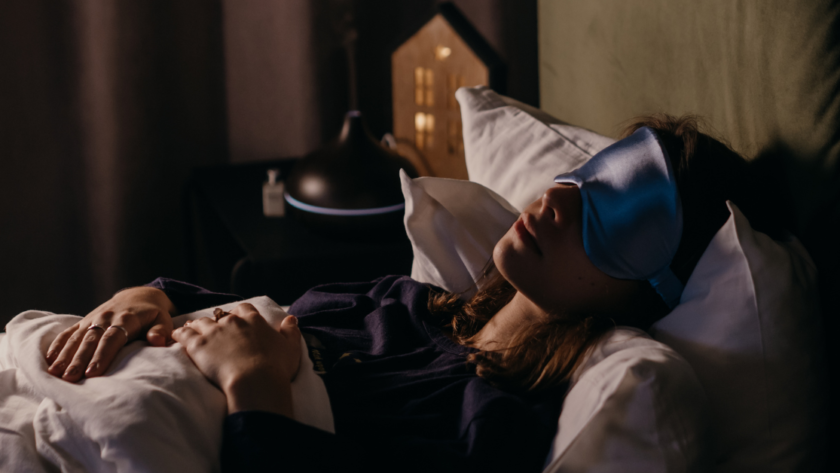As a devoted Christian, I’ve often found myself tossing and turning at night, my mind racing with worries and prayers. That’s why I was thrilled to uncover Christian sleep apps.
These innovative tools offer a unique blend of faith-based relaxation techniques, biblical meditation, and sleep science to help believers find peaceful rest while growing closer to God.
The Rise of Faith-Based Sleep Technology
Christian sleep apps have emerged as a powerful tool for those seeking to incorporate their faith into every aspect of their lives, including sleep. These apps mix traditional sleep aid techniques with Christian principles, offering a holistic approach to rest that nourishes both body and soul.
Theoretical Background
The concept of Christian sleep aids has deep roots in ancient monastic practices like praying the hours, which included Compline, or night prayer. Modern technology has adapted these age-old practices for the digital age, making them accessible to believers worldwide.
Research supports the effectiveness of faith-based relaxation techniques. A 2019 study published in the Journal of Religion and Health found that religious practices, including prayer and meditation, can significantly improve sleep quality.
This scientific backing adds credibility to the growing Christian sleep app market, which was valued at $6.4 billion in 2020.
Practical Applications
Christian sleep apps offer a wide range of features designed to promote restful sleep and spiritual growth. These may include:
Bedtime Bible Verses and Devotionals
Many apps provide a daily selection of Scripture passages specifically chosen for nighttime reflection. These verses often focus on themes of peace, rest, and God’s protection, helping users center their thoughts on faith as they prepare for sleep.
Guided Christian Meditation
These meditations mix biblical principles with relaxation techniques, guiding users through breathing exercises and visualization while focusing on Scripture or Christian themes. This practice can help calm anxious thoughts and promote a sense of spiritual peace.
Scripture Lullabies and Christian Sleep Music
Gentle melodies paired with biblical lyrics or instrumental versions of hymns create a soothing atmosphere for sleep. This music can help drown out distracting thoughts and create a peaceful environment conducive to rest.
Nighttime Prayers and Worship
Some apps offer guided prayer sessions or short worship experiences designed for bedtime. These features can help users end their day in communion with God, fostering a sense of spiritual closeness and peace.
Faith-Based Sleep Tracking
Certain apps incorporate sleep tracking technology with a Christian perspective, allowing users to watch their sleep patterns while receiving spiritual encouragement and insights.
Spiritual Dream Journaling
This feature encourages users to record and reflect on their dreams from a faith-based perspective, potentially deepening their spiritual understanding and connection with God.
Overcoming Challenges
While Christian sleep apps offer many benefits, they’re not without challenges. One potential issue is the risk of becoming overly reliant on technology for spiritual practices.
To overcome this, it’s important to use these apps as a supplement to, as opposed to a replacement for, traditional spiritual disciplines like personal prayer and Bible study.
Another concern is the potential for app addiction. To avoid this, set boundaries for app usage and confirm that your nighttime routine includes offline spiritual practices as well.
Implementing Christian Sleep Apps: A Step-by-Step Guide
1. Choose the Right App
Start by researching different Christian sleep apps. Look for ones that align with your denominational preferences and offer features that appeal to you.
Consider factors such as:
- Doctrinal alignment
- User interface and ease of use
- Range of features offered
- User reviews and ratings
- Cost (free vs. paid options)
Take advantage of free trials when available to test out different apps before committing to one.
2. Set Up Your Profile
Many apps allow you to customize content based on your spiritual needs and sleep goals. Take time to set this up thoughtfully.
You might be able to:
- Select preferred Bible translations
- Choose areas of spiritual growth you want to focus on
- Set sleep goals and preferences
- Customize notification settings
The more personalized your experience, the more likely you are to benefit from the app.
3. Create a Faith-Based Bedtime Routine
Use the app to establish a consistent routine that incorporates elements like Bible reading, prayer, and Christian meditation. A sample routine might look like this:
- Read a short devotional or Bible passage
- Listen to a Christian sleep story or guided meditation
- Engage in a brief prayer session
- Fall asleep to soft Christian music or nature sounds
Consistency is key. Try to stick to your routine even on weekends or when traveling.
4. Engage with Guided Content
Start with guided meditations or sleep stories to help you learn how to incorporate faith into your relaxation process. These structured experiences can teach you techniques for combining Scripture, prayer, and relaxation that you can later apply on your own.
5. Track Your Progress
If the app offers sleep tracking, use this feature to watch how your sleep quality improves over time. Pay attention to factors like:
- Total sleep time
- Sleep efficiency (time asleep vs. time in bed)
- Number of awakenings
- Subjective sleep quality
Many apps also allow you to track spiritual metrics, such as time spent in prayer or Scripture reading.
6. Reflect and Journal
Many apps include features for spiritual journaling. Use these to reflect on your dreams and nighttime spiritual experiences.
Consider:
- How your sleep is affecting your spiritual life
- Any recurring themes in your dreams
- Insights gained during nighttime prayer or meditation
- Areas where you’re seeing spiritual growth
Regular reflection can help you identify patterns and areas for further growth.
7. Gradually Increase Spiritual Depth
As you become more comfortable with the app, explore more advanced features like deeper biblical meditations or spiritual sleep coaching. You might:
- Engage in longer guided prayer sessions
- Explore more complex theological concepts in nighttime devotionals
- Participate in multi-day spiritual sleep challenges
- Connect with other users for accountability and encouragement
Remember, spiritual growth is a gradual process. Don’t rush it, but do challenge yourself to go deeper over time.
Common Pitfalls and How to Avoid Them
Over-reliance on Technology
While apps can be helpful, they shouldn’t replace personal prayer and Bible study. Set aside time for offline spiritual practices.
Try to have at least one “tech-free” night per week where you engage in traditional spiritual disciplines without the app.
Ignoring Physical Sleep Hygiene
Remember that spiritual practices work best in conjunction with good sleep hygiene. Maintain a cool, dark sleeping environment and stick to a consistent sleep schedule.
Avoid screens for at least an hour before bed (except for using your sleep app, of course).
Neglecting Community
Don’t let app usage isolate you from your faith community. Share your experiences and insights with fellow believers.
Consider starting a small group focused on spiritual sleep practices, or talk about what you’re learning with your pastor or spiritual mentor.
Misinterpreting Spiritual Experiences
Be cautious about attributing too much spiritual significance to dreams or sleep-related experiences. While God can certainly speak through dreams, not every dream is a divine message.
Consult with spiritual leaders if you’re unsure about the meaning of a particular experience.
Adapting Christian Sleep Apps to Different Scenarios
For Couples
Some apps offer features for shared devotionals or prayers. Use these to strengthen your spiritual bond before sleep.
You might:
- Read a devotional aloud together
- Pray for each other using guided prompts
- Listen to a Christian sleep story together
- Discuss your spiritual reflections from the day
For Families
Look for apps with child-friendly content like biblical bedtime stories to create a family-wide spiritual bedtime routine. You could:
- Have children take turns choosing a Bible story to listen to
- Engage in family prayer time using app prompts
- Create a calming bedtime atmosphere with Christian lullabies
- Use app-based devotionals as a starting point for family discussions
For Shift Workers
If you have an irregular schedule, use the app’s customizable features to create a spiritual routine that fits your unique sleep patterns. Consider:
- Using shorter meditations or devotionals when time is limited
- Setting custom reminders that align with your work schedule
- Utilizing offline features when you can’t access your phone at work
- Creating multiple routines for different shift patterns
For Those with Sleep Disorders
Some apps offer specific content for addressing issues like insomnia or sleep paralysis from a Christian perspective. Explore these targeted resources.
They might include:
- Prayers specifically for anxiety relief
- Meditations focused on surrendering control to God
- Biblical perspectives on night terrors or sleep paralysis
- Guided imagery for peaceful sleep onset
Remember to use these in conjunction with, not as a replacement for, professional medical treatment.
Building on Basics for Spiritual Mastery
As you become more comfortable with using Christian sleep apps, you can start to deepen your practice. This might involve:
Exploring Advanced Biblical Sleep Science Concepts
Dive deeper into the intersection of faith and sleep science. Study biblical passages related to sleep and rest, and explore how modern sleep research aligns with scriptural principles.
Some apps offer advanced courses or articles on these topics.
Engaging in More Complex Nighttime Theological Reflections
Move beyond basic devotionals to more in-depth theological studies. You might explore:
- The symbolism of sleep and dreams in Scripture
- Theological perspectives on rest and Sabbath
- The role of sleep in spiritual formation
- Biblical characters’ experiences with sleep and dreams
Practicing Christian Sleep Visualization Techniques
Learn to use visualization techniques that incorporate Christian imagery and themes. This might include:
- Imagining yourself in biblical scenes of peace and rest
- Visualizing Jesus’ presence with you as you fall asleep
- Creating mental pictures of heavenly realms described in Scripture
- Using Christian symbols as focal points for relaxation
Exercises to Enhance Your Experience
Scripture Memorization
Choose a sleep-related Bible verse each week to memorize and meditate on as you fall asleep. Some suggestions:
- “In peace I will lie down and sleep, for you alone, Lord, make me dwell in safety.” (Psalm 4:8)
- “When you lie down, you will not be afraid – when you lie down, your sleep will be sweet.” (Proverbs 3:24)
- “Come to me, all you who are weary and burdened, and I will give you rest.” (Matthew 11:28)
Prayer Journaling
Before bed, write down your prayers in a journal, then reflect on answered prayers in the morning. This practice can help you see God’s faithfulness over time and cultivate an attitude of gratitude.
Spiritual Sleep Environment
Create a sleep space that reflects your faith. This might include:
- Hanging meaningful Christian artwork
- Placing a Bible or devotional book on your nightstand
- Using a diffuser with calming scents mentioned in Scripture (like frankincense or myrrh)
- Playing soft Christian music or nature sounds associated with biblical locations
Fasting from Technology
Once a week, try your spiritual sleep routine without the app to confirm you’re not overly reliant on technology. This can help you internalize the practices you’ve learned and deepen your personal connection with God.
Dream Interpretation Study
Learn about biblical dream interpretation to add depth to your spiritual dream journaling practice. While not all dreams have spiritual significance, understanding biblical principles of dream interpretation can enrich your spiritual life.
People Also Asked
What are the best Christian sleep apps?
Popular Christian sleep apps include Abide, Pray.com, Soultime, and Hallow. The best app for you depends on your denominational preferences and specific needs.
Can Christian meditation help with insomnia?
Many users report improved sleep after using Christian meditation apps. While not a replacement for medical treatment, faith-based relaxation techniques can complement other insomnia treatments.
Are there free Christian sleep apps available?
Yes, many Christian sleep apps offer free versions with limited features. Paid versions typically provide access to more content and advanced features.
How do Christian sleep apps differ from secular ones?
Christian sleep apps incorporate biblical content, prayers, and faith-based meditations, while secular apps focus solely on relaxation techniques and sleep science.
Can children use Christian sleep apps?
Some Christian sleep apps offer child-friendly content like biblical bedtime stories. Always review app content before allowing children to use it.
Do Christian sleep apps work for non-Christians?
While designed for Christians, anyone interested in faith-based relaxation techniques may benefit from these apps. However, the content may not resonate as strongly with non-believers.
How often should I use a Christian sleep app?
For best results, try to use the app as part of your nightly routine. Consistency is vital in developing healthy sleep habits and deepening your faith.
Can Christian sleep apps replace my regular Bible study?
Christian sleep apps should supplement, not replace, regular Bible study and prayer. They’re tools to enhance your spiritual life, not substitutes for personal devotion time.
Are there Christian sleep apps for couples?
Some Christian sleep apps offer features designed for couples, such as shared devotionals or prayer prompts for partners.
How do I choose the right Christian sleep app for me?
Consider factors like your denominational background, preferred features, user interface, and cost when selecting an app. Many offer free trials, allowing you to test before committing.
Key Takeaways
- Christian sleep apps offer a unique blend of faith and sleep science for better rest and spiritual growth.
- These apps can be powerful tools when used in conjunction with traditional spiritual practices.
- A thoughtful, consistent approach to using these apps can lead to improved sleep quality and a deeper faith life.
- As with any spiritual tool, it’s important to use these apps wisely and avoid common pitfalls like over-reliance on technology.
- With practice, Christian sleep apps can become a meaningful part of your spiritual journey, enhancing both your rest and your relationship with God.




